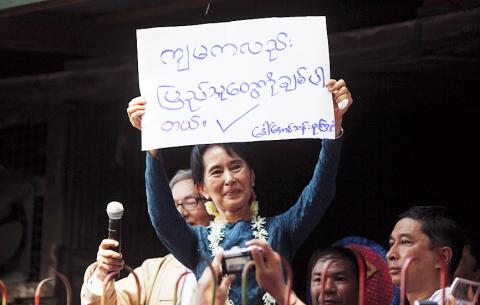|
¡@
Aung Sang Suu Kyi appeals for unity
FREE AS A BIRD:There were some concerns that conditions
might be attached to the Nobel laureate¡¦s release, but a government official
said she was freed unconditionally
AFP, YANGON, MYANMAR

Aung San Suu Kyi holds a sign reading ¡§I love
the public too¡¨ while addressing supporters outside her National League for
Democracy headquarters yesterday in Yangon, Myanmar.
Photo: REUTERS
Democracy leader Aung San Suu Kyi reached out to Myanmar¡¦s splintered opposition
forces yesterday as she addressed thousands of exuberant supporters following
her release from years of house arrest.
¡§I want to hear the voice of the people, after that we will decide what we want
to do,¡¨ she told a sea of followers outside her party headquarters. ¡§I want to
work with all democratic forces. I believe in human rights and I believe in the
rule of law.¡¨
The daughter of Myanmar¡¦s independence hero carries a weight of expectation
among her supporters for a better future for the nation after almost half a
century of military dictatorship.
The Nobel Peace Prize winner was freed on Saturday after spending most of the
last two decades locked up, in a move greeted with jubilation by her followers
and -welcomed by rights groups and governments around the world.
However, it remains to be seen whether the most famous dissident in Myanmar can
live up to her long-suffering compatriots¡¦ high expectations.
A huge crowd gathered outside the headquarters of Aung San Suu Kyi¡¦s National
League for Democracy for the speech and television pictures showed her
struggling to make her way through the throng.
Thousands of her supporters had roared with approval on Saturday as Aung San Suu
Kyi appeared for the first time outside her lakeside home after the end of her
latest seven-year stretch of detention.
Attention is focused on whether she can reunite the divided opposition after an
election widely criticized by the West as a sham to prolong military rule behind
a facade of democracy.
Western nations and pro--democracy activists have blasted the Nov. 7 poll as
anything but free and fair following widespread reports of intimidation and
fraud.
Aung San Suu Kyi¡¦s party boycotted the vote, a decision that deeply split the
opposition.
Many in the impoverished nation see the democracy icon as their best chance for
freedom.
¡§Our country must become democratic. Our future depends on Aung San Suu Kyi,¡¨
said National League for Democracy youth leader Nyi Min. ¡§She gives us hope and
courage. Only she can free us from this anarchist regime.¡¨
Many countries were quick to welcome her release, with US President Barack Obama
hailing her as ¡§a hero of mine.¡¨
UN Secretary General Ban Ki-moon described Aung San Suu Kyi as ¡§an inspiration¡¨
to the world, but said the junta must release all political prisoners.
Setting her free is a huge gamble for Myanmar¡¦s generals and observers see it as
an attempt to tame criticism of a controversial election last Sunday, the
country¡¦s first in 20 years.
Some had feared that the junta, whose proxies claimed overwhelming victory in
the vote, would continue to place restrictions on the freedom of its No. 1
enemy, but no restrictions were placed on her release, according to a senior
government official as well as her lawyer Nyan Win.
¡§There was no condition on her release. She is completely free,¡¨ Nyan Win said.
¡§She is very glad and happy.¡¨
Aung San Suu Kyi had been under house arrest since 2003 ¡X just one of several
stretches of detention at the hands of the ruling generals.
Her sentence was extended last year over a bizarre incident in which an US
citizen swam uninvited to her lakeside home, sparking international condemnation
and keeping her off the scene for last Sunday¡¦s vote.
The pro-democracy leader and her party swept to victory in a 1990 election, but
were never allowed to take power.
Aung San Suu Kyi¡¦s struggle for her country has come at a high personal cost:
her husband, British academic Michael Aris, died in 1999, and in the final
stages of his battle with cancer the junta refused him a visa to see his wife.
She has not seen her two sons for about a decade and has never met her
grandchildren.
¡@
|
![]()
![]()
![]()